- Clone
- 7H20-I19-M3 (See other available formats)
- Regulatory Status
- RUO
- Other Names
- Interleukin 21
- Isotype
- Mouse IgG1, κ
- Ave. Rating
- Submit a Review
- Product Citations
- publications

-

Recombinant Human IL-21 (lane 1) and Mouse IL-21 (lane 2) were resolved by electrophoresis, transferred to nitrocellulose, and probed with biotin anti-HU/MU IL-21 antibody (clone 7H20-I19-M3). Proteins were visualized using a Streptavidin conjugated to HRP and chemiluminscence detection. -

Human PBMCs, stimulated with 1 µg/ml of LPS for 8 h and treated with Brefeldin A during the last 4 h, were prepared by cytospin, fixed and permeabilized on a slide and then treated with endogenous biotin blocking kit (Vector labs). Slides were stained with anti-human IL-21 biotin (clone 7H20-I19-M3) and DyLight™ 649 streptavidin (green) and counterstained with DAPI (blue). Images were acquired with an Olympus FV10i confocal microscope. Images courtesy of Teresa Rodriguez, Darius Schneider, and Matthias von Herrath, LaJolla Institute for Allergy and Immunology.
| Cat # | Size | Price | Quantity Check Availability | Save | ||
|---|---|---|---|---|---|---|
| 514303 | 50 µg | £73 | ||||
Interleukin 21 (IL-21) is a potent immunomodulatory cytokine mainly produced by NKT and CD4+ T-cells, particularly the inflammatory Th17 subset and has pleiotropic effects on both innate and adaptive immune responses. These actions include positive effects such as enhancing proliferation of NK cells and cytotoxic T cells, and inhibitory effects on the antigen-presenting function of dendritic cells. It can also be proapoptotic for B cells and NK cells. Recent studies have shown that IL-21 is also an autocrine cytokine that potently induces T(H)17 differentiation and suppresses Foxp3 expression, and serves as a target for treating inflammatory diseases.
Product DetailsProduct Details
- Verified Reactivity
- Human
- Reported Reactivity
- Mouse
- Antibody Type
- Monoclonal
- Host Species
- Mouse
- Immunogen
- Recombinant full length human IL-21
- Formulation
- Phosphate-buffered solution, pH 7.2, containing 0.09% sodium azide.
- Preparation
- The antibody was purified by affinity chromatography, and conjugated with biotin under optimal conditions.
- Concentration
- 0.5 mg/mL
- Storage & Handling
- The antibody solution should be stored undiluted between 2°C and 8°C. Do not freeze.
- Application
-
WB - Quality tested
ICC - Verified - Recommended Usage
-
Each lot of this antibody is quality control tested by Western blotting. Western blotting, suggested working dilution(s): Use 5 µg antibody per 5 mL antibody dilution buffer for each mini-gel. It is recommended that the reagent be titrated for optimal performance for each application.
- Application Notes
-
This product weakly reacts with Mouse.
- RRID
-
AB_2125168 (BioLegend Cat. No. 514303)
Antigen Details
- Distribution
-
Th17
- Function
- Immunomodulation
- Cell Sources
- NK-T cells and T cells
- Cell Targets
- cytotoxic T cells (CTL) and Natural Killer (NK) cells, that can destroy malignant or infected cells
- Receptors
- IL-21R
- Cell Type
- Th17
- Biology Area
- Immunology, Innate Immunity
- Molecular Family
- Cytokines/Chemokines
- Antigen References
-
1. Nurieva R,et al. 2007. Nature 448:416.
2. Parrish-Novak J, et al. 2002. J. Leukocyte Biol. 72:856.
3. Dumoutier L, et al. 2000. Proc. Natl. Acad. Sci. USA 97:10144.
4. Asao H, et al. 2001. J. Immunol. 167:1.
5. Parrish-Novak J, et al. 2000. Nature 408:57. - Gene ID
- 59067 View all products for this Gene ID 60505 View all products for this Gene ID
- UniProt
- View information about IL-21 on UniProt.org
Related FAQs
- How many biotin molecules are per antibody structure?
- We don't routinely measure the number of biotins with our antibody products but the number of biotin molecules range from 3-6 molecules per antibody.
Other Formats
View All IL-21 Reagents Request Custom Conjugation| Description | Clone | Applications |
|---|---|---|
| Purified anti-human/mouse IL-21 | 7H20-I19-M3 | WB |
| Biotin anti-human/mouse IL-21 | 7H20-I19-M3 | WB,ICC |
Customers Also Purchased
Compare Data Across All Formats
This data display is provided for general comparisons between formats.
Your actual data may vary due to variations in samples, target cells, instruments and their settings, staining conditions, and other factors.
If you need assistance with selecting the best format contact our expert technical support team.
-
Purified anti-human/mouse IL-21

Recombinant Human IL-21 (lane 1) and Mouse IL-21 (lane 2) we... -
Biotin anti-human/mouse IL-21

Recombinant Human IL-21 (lane 1) and Mouse IL-21 (lane 2) we... 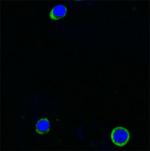
Human PBMCs, stimulated with 1 µg/ml of LPS for 8 h and trea...
 Login / Register
Login / Register 








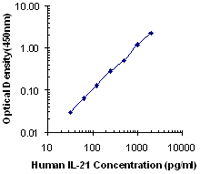
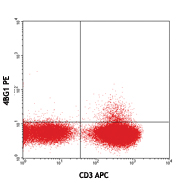
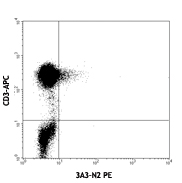
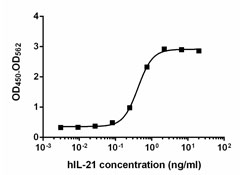



Follow Us